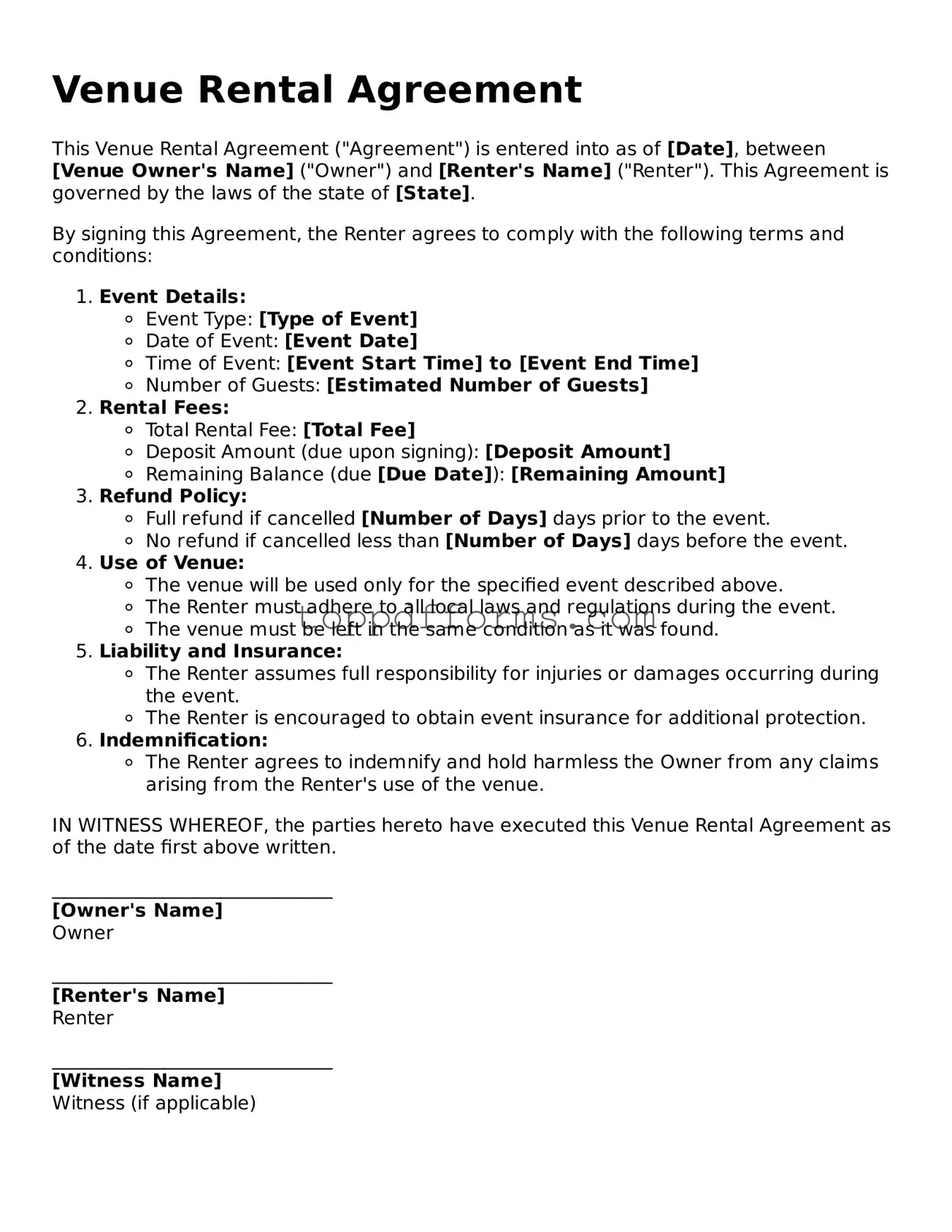Free Venue Rental Agreement Template
Things You Should Know About This Form
What is a Venue Rental Agreement?
A Venue Rental Agreement is a legal document that outlines the terms and conditions for renting a specific venue for events such as weddings, parties, or corporate gatherings. This agreement typically includes details about the rental period, payment terms, security deposits, and any restrictions or rules that apply to the use of the venue.
What information is typically included in the Venue Rental Agreement?
The agreement generally includes the names of the parties involved, the address of the venue, the date and time of the event, rental fees, payment schedules, cancellation policies, and any additional services provided by the venue, such as catering or equipment rental. It may also outline the responsibilities of both the renter and the venue owner regarding maintenance and liability.
What are the common payment terms in a Venue Rental Agreement?
Payment terms can vary but usually include an upfront deposit to secure the booking, with the balance due before the event date. Some agreements may specify a payment schedule, while others may require full payment at the time of signing. It is essential to review these terms carefully to avoid misunderstandings.
Can the Venue Rental Agreement be modified after signing?
Yes, modifications to the Venue Rental Agreement can be made, but both parties must agree to the changes. It is advisable to document any amendments in writing and have both parties sign the revised agreement to ensure clarity and enforceability.
What happens if the event is canceled?
Cancellation policies are typically outlined in the Venue Rental Agreement. Depending on the terms, the renter may lose their deposit or be required to pay a cancellation fee. Some agreements allow for a full refund if the cancellation occurs within a specified timeframe, while others may have a strict no-refund policy. It is crucial to understand these terms to avoid unexpected financial loss.
PDF Overview
| Fact Name | Description |
|---|---|
| Purpose | The Venue Rental Agreement form is used to outline the terms and conditions for renting a venue for events such as weddings, parties, or corporate functions. |
| Parties Involved | This agreement typically involves the venue owner or manager and the individual or organization renting the space. |
| Governing Law | In the United States, the governing law for venue rental agreements varies by state. For example, in California, it falls under the California Civil Code. |
| Key Elements | Important components of the agreement include rental fees, deposit requirements, cancellation policies, and liability clauses. |
| Duration | The agreement specifies the duration of the rental, including setup and breakdown times, ensuring all parties are aware of the timeline. |
Common mistakes
Filling out a Venue Rental Agreement form can seem straightforward, but many individuals make common mistakes that can lead to complications later on. One frequent error is overlooking the date and time section. It is crucial to specify the exact date and time for the event. Failure to do so can result in double bookings or misunderstandings about when the venue is actually reserved.
Another common mistake involves not providing accurate contact information. This includes phone numbers and email addresses. If the venue manager needs to reach you for any reason, having incorrect or outdated contact information can create unnecessary delays or issues.
People often neglect to read the terms and conditions carefully. This section outlines important rules and regulations regarding the use of the venue. Ignoring these details can lead to misunderstandings or violations that may incur additional fees or penalties.
Additionally, many individuals forget to include any special requests or requirements they might have. Whether it's specific seating arrangements or equipment needs, failing to communicate these details can lead to a disappointing experience on the day of the event.
Another mistake is miscalculating the total rental cost. It is essential to account for all fees, including deposits and any additional charges for services. An oversight here can strain your budget and lead to confusion during payment.
Lastly, some people do not pay attention to the cancellation policy. Understanding the terms regarding cancellations or rescheduling is vital. Ignoring this information can result in lost deposits or other financial repercussions if plans change unexpectedly.
Different Types of Venue Rental Agreement Templates:
Parking Agreement Template - May require notice period for lease termination.
Termination of Tenancy Notice - This form can safeguard tenants' rights during the lease termination process.
The California Lease Agreement form is a legal document that outlines the terms and conditions between a landlord and a tenant for renting a residential property. This agreement serves to protect the rights of both parties while clearly defining their responsibilities. Understanding this form is essential for ensuring a smooth rental experience; fill out the form by clicking the button below or visit https://califroniatemplates.com/fillable-lease-agreement for more information.
Week to Week Rental Agreement - Details any restrictions on the use of the rental property.
